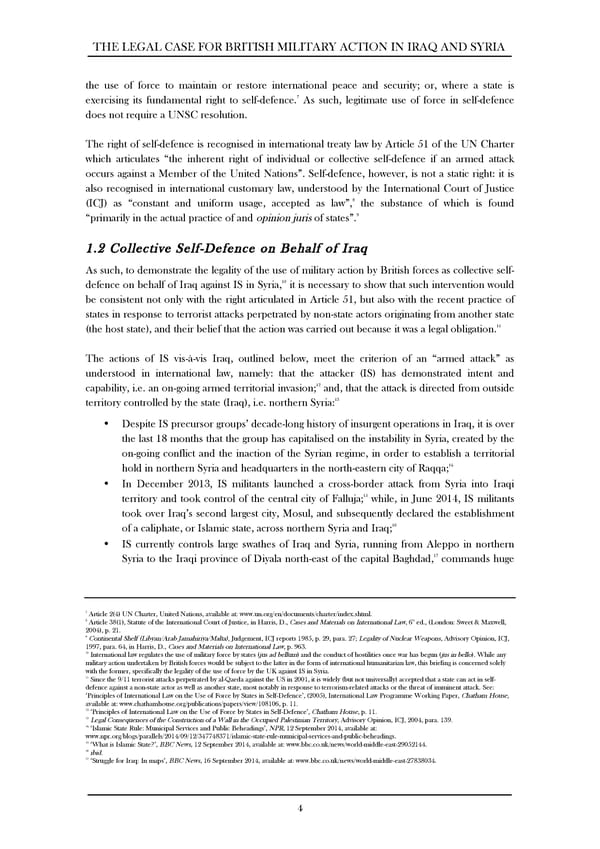THE LEGAL CASE FOR BRITISH MILITARY ACTION IN IRAQ AND SYRIA the use of force to maintain or restore international peace and security; or, where a state is 7 exercising its fundamental right to self-defence. As such, legitimate use of force in self-defence does not require a UNSC resolution. The right of self-defence is recognised in international treaty law by Article 51 of the UN Charter which articulates “the inherent right of individual or collective self-defence if an armed attack occurs against a Member of the United Nations”. Self-defence, however, is not a static right: it is also recognised in international customary law, understood by the International Court of Justice (ICJ) as “constant and uniform usage, accepted as law”,8 the substance of which is found 9 “primarily in the actual practice of and opinion juris of states”. 1.2 Collective Self-Defence on Behalf of Iraq As such, to demonstrate the legality of the use of military action by British forces as collective self- 10 defence on behalf of Iraq against IS in Syria, it is necessary to show that such intervention would be consistent not only with the right articulated in Article 51, but also with the recent practice of states in response to terrorist attacks perpetrated by non-state actors originating from another state 11 (the host state), and their belief that the action was carried out because it was a legal obligation. The actions of IS vis-à-vis Iraq, outlined below, meet the criterion of an “armed attack” as understood in international law, namely: that the attacker (IS) has demonstrated intent and capability, i.e. an on-going armed territorial invasion;12 and, that the attack is directed from outside 13 territory controlled by the state (Iraq), i.e. northern Syria: • Despite IS precursor groups’ decade-long history of insurgent operations in Iraq, it is over the last 18 months that the group has capitalised on the instability in Syria, created by the on-going conflict and the inaction of the Syrian regime, in order to establish a territorial hold in northern Syria and headquarters in the north-eastern city of Raqqa;14 • In December 2013, IS militants launched a cross-border attack from Syria into Iraqi 15 territory and took control of the central city of Falluja; while, in June 2014, IS militants took over Iraq’s second largest city, Mosul, and subsequently declared the establishment of a caliphate, or Islamic state, across northern Syria and Iraq;16 • IS currently controls large swathes of Iraq and Syria, running from Aleppo in northern 17 Syria to the Iraqi province of Diyala north-east of the capital Baghdad, commands huge 7 Article 2(4) UN Charter, United Nations, available at: www.un.org/en/documents/charter/index.shtml. 8 Article 38(1), Statute of the International Court of Justice, in Harris, D., Cases and Materials on International Law, 6th ed., (London: Sweet & Maxwell, 2004), p. 21. 9 Continental Shelf (Libyan/Arab Jamahiriya/Malta), Judgement, ICJ reports 1985, p. 29, para. 27; Legality of Nuclear Weapons, Advisory Opinion, ICJ, 1997, para. 64, in Harris, D., Cases and Materials on International Law, p. 963. 10 International law regulates the use of military force by states (jus ad bellum) and the conduct of hostilities once war has begun (jus in bello). While any military action undertaken by British forces would be subject to the latter in the form of international humanitarian law, this briefing is concerned solely with the former, specifically the legality of the use of force by the UK against IS in Syria. 11 Since the 9/11 terrorist attacks perpetrated by al-Qaeda against the US in 2001, it is widely (but not universally) accepted that a state can act in self- defence against a non-state actor as well as another state, most notably in response to terrorism-related attacks or the threat of imminent attack. See: ‘Principles of International Law on the Use of Force by States in Self-Defence’, (2005), International Law Programme Working Paper, Chatham House, available at: www.chathamhouse.org/publications/papers/view/108106, p. 11. 12 ‘Principles of International Law on the Use of Force by States in Self-Defence’, Chatham House, p. 11. 13 Legal Consequences of the Construction of a Wall in the Occupied Palestinian Territory, Advisory Opinion, ICJ, 2004, para. 139. 14 ‘Islamic State Rule: Municipal Services and Public Beheadings’, NPR, 12 September 2014, available at: www.npr.org/blogs/parallels/2014/09/12/347748371/islamic-state-rule-municipal-services-and-public-beheadings. 15 ‘What is Islamic State?’, BBC News, 12 September 2014, available at: www.bbc.co.uk/news/world-middle-east-29052144. 16 ibid. 17 ‘Struggle for Iraq: In maps’, BBC News, 16 September 2014, available at: www.bbc.co.uk/news/world-middle-east-27838034. 4
 The legal case for action Page 3 Page 5
The legal case for action Page 3 Page 5